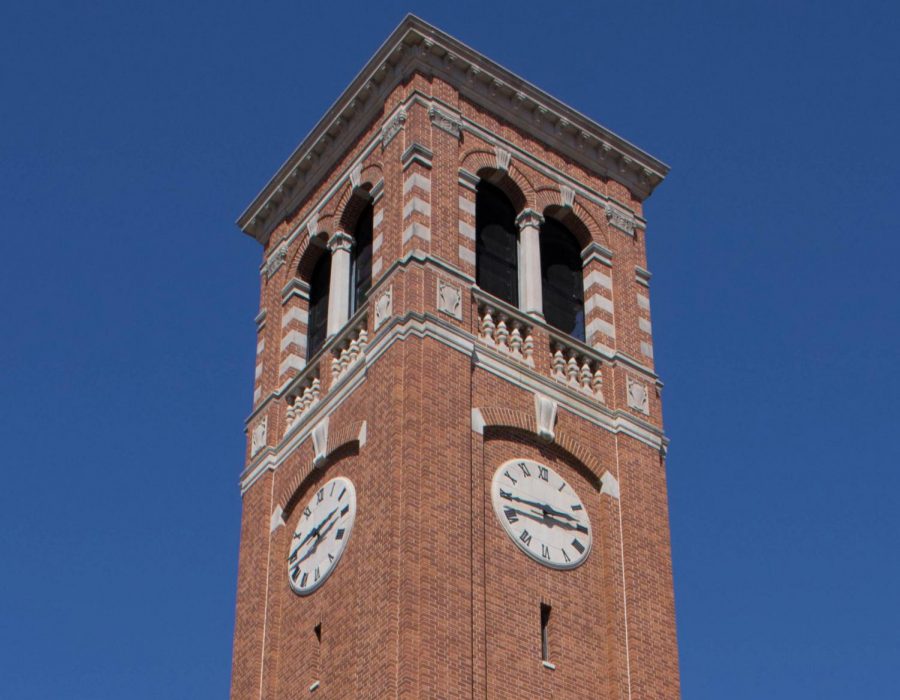UNI receives voter turnout award
The Panther Promise Program is one of several programs designed to boost enrollment at UNI.
Oct 8, 2018
UNI recently received the Silver Seal from the ALL IN Campus Democracy Challenge for its high-level voter participation in the 2016 presidential election.
Only campuses with 60-69 percent voter participation receive this particular award.
67.5 percent of UNI students voted in the 2016 election, which makes it the university with the second highest voter participation in the country, right behind the University of Baltimore.
“We knew this was a campus that was good at that sort of thing,” said associate professor of political science Justin Holmes, chairperson of the American Democracy Project Committee.
“It’s a very engaged campus. Iowa in general [. . .] is a high participation state. We’re always near the top in terms of every participation. But I’ll be darned, we sent this report into this national organization, and they retroactively gave us this Silver Seal.”
UNI got involved with the challenge over the summer when Holmes attended a conference about increasing democratic participation among undergraduate students.
Holmes reviewed UNI’s statistics on voter participation with Campus Election Engagement Project (CEEP) State Director Samantha Bayne. When Bayne saw how high UNI’s voter participation was, she suggested that UNI should participate in the ALL IN challenge.
“I think it’s also important to note the high percentage of students on campus who are Iowa students,” said Northern Iowa Student Government (NISG) Director of Government Relations Matt Johnson.
“I think that’s really unique to our institution. We’re surrounded by elections that are happening in Iowa, so Iowa students can see their direct connection to the election [ . . .] We all have a connection because we’re here at UNI, but we also have a connection because we’re all Iowans.”
Voter turnout is usually higher in presidential elections than for midterm elections, so Holmes is not expecting the same voter participation numbers in the 2018 election. His goal is a 40 percent voter turnout among UNI students, which would be a 10 point increase from UNI’s 2014 midterm election voter turnout.
“This is a midterm year, and it really, really does matter,” said Brenna Wolfe, a senior majoring in political science and public administration and who has been working with the American Democracy Project.
“The research shows over and over again that youth influence vote in this election is really important and very influential. It can determine who wins our congressional seat. Jeff Danielson—he is our state senator right now and he got elected in 2008 by 22 votes.”
Wolfe also encourages students to vote because state politics affects UNI and the cost of tuition.
The ALL IN Challenge requires campuses to submit an action plan to the Campus Democracy Challenge. Holmes wrote UNI’s plan.
One of the central priorities UNI wants to work on is coordination among different partisan groups and NISG. This coordinated effort has been branded as the #PanthersVote coalition.
“There [had] been different organizations that have been doing their own thing as well as NISG doing their own thing,” Johnson said.
“But Drew [Stensland] and Kristen’s [Ahart] platform and vision for their administration has been a lot more campus engagement, so it was a perfect opportunity to mix election engagement with campus engagement [. . .] I wanted to make it a campus push for everyone who wanted to be involved in campus engagement. Because despite the different groups who were involved, voter engagement is a non-partisan issue, but we all have the same vision in getting people registered to vote.”
On National Voter Registration Day, Sept. 25, the #PanthersVote coalition encouraged students across campus to register to vote.
“I’ve been really, really pleased with people registering,” Johnson said about the outcome of Voter Registration Day.
“But not only that—it’s been really, really great overall to see the overall campus work and see all the different people step up and not view it as their personal platform to push stuff politically but pushing stuff civically, getting people to vote.”
Only 17.1 percent of people in the 18 to 24 age bracket voted in the 2014 midterm election, according to the Center for Information & Research on Civic Learning and Engagement. Holmes believes a major reason for these statistics is that college students move every year. Each time a person moves they have to re-register to vote, so voting can be more work for college students.
Holmes also thinks that young people usually aren’t as informed on politics.
“Often times when you’re a high school student, you can’t vote, so you’re not following current events,” Holmes said. “So a lot of college students haven’t been following politics up to that point, and it is confusing, just knowing the basics of what the parties stand for. What do I think is good policy? What do I stand for? Who do I think lines up with what I stand for? That’s a challenge.”
Holmes suggests that students who want to become more politically educated should take a few minutes each day to read the news from at least one news source and follow news sources on social media.
“There’s older people [who] think that youths won’t go out and vote,” Wolfe said. “Research does show that we don’t go out and vote, so let’s prove them wrong.”
The next phase of the #PanthersVote coalition is encouraging students to take advantage of the satellite voting that is happening throughout October in the Union, Redaeker Center and Schindler Education Center. Satellite voting is for voters registered in Black Hawk County, but it is possible for students to register right before they cast their ballot.














